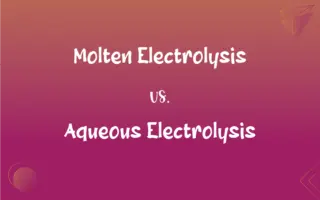Acetone vs. Nail Polish Remover: What's the Difference?
Edited by Aimie Carlson || By Harlon Moss || Published on February 10, 2024
Acetone is a powerful, fast-acting solvent used in various industries, including as a key ingredient in many nail polish removers.

Key Differences
Acetone is a colorless, volatile liquid with a distinct smell, widely used as a solvent in the chemical industry. Nail polish remover is a cosmetic product designed to remove nail polish, and it often contains acetone as a primary ingredient, but it can also be acetone-free.
In its pure form, acetone can be harsh on the skin and nails, potentially causing dryness or irritation. Nail polish removers, while frequently acetone-based, can include additional ingredients like oils, fragrances, and vitamins to mitigate the harshness and nourish the skin and nails.
Acetone is known for its effectiveness in quickly dissolving nail polish, making it a popular choice for professional manicurists. However, acetone-free nail polish removers, which use alternative solvents, are gentler but may require more effort and time to remove polish.
Acetone is also used in various other applications outside of cosmetics, such as in the production of plastics and pharmaceuticals. Nail polish remover, on the other hand, is specifically formulated for cosmetic use, particularly for removing nail polish.
In terms of safety, acetone can be flammable and should be used in a well-ventilated area. Nail polish removers, particularly those that are acetone-free, are generally safer and less volatile but still require careful handling.
ADVERTISEMENT
Comparison Chart
Composition
Pure chemical compound
Blend of solvents, may include acetone
Primary Use
Industrial solvent, nail polish remover ingredient
Specifically for removing nail polish
Harshness
Can be harsh on skin and nails
Often formulated to be gentler
Effectiveness
Fast-acting in polish removal
Varies; acetone-based is typically more effective
Other Ingredients
No additional ingredients
May include oils, fragrances, vitamins
ADVERTISEMENT
Acetone and Nail Polish Remover Definitions
Acetone
Acetone is effective in breaking down and removing resins and plastics.
They used acetone to clean the resin tools.
Nail Polish Remover
Nail polish remover is specifically formulated for cosmetic use.
The bottle labeled 'nail polish remover' was on her vanity.
Acetone
Acetone is a solvent used in various industries and cosmetics.
Acetone quickly dissolves nail polish during a manicure.
Nail Polish Remover
Nail polish remover is a cosmetic solution for removing nail polish.
She used nail polish remover to clean off her old polish.
Acetone
Acetone is a colorless, highly volatile liquid with a distinct smell.
The strong smell in the lab was due to acetone.
Nail Polish Remover
Nail polish removers often include oils and vitamins for nail health.
Her nail polish remover contained vitamin E and aloe.
Acetone
Acetone is known for its quick-drying properties.
Acetone evaporated quickly from the cleaned surface.
Nail Polish Remover
Nail polish remover can contain acetone or be acetone-free.
She preferred acetone-free nail polish remover for her sensitive nails.
Acetone
Acetone can be harsh on the skin, causing dryness.
After using acetone, her skin felt very dry.
Nail Polish Remover
Nail polish removers can vary in strength and effectiveness.
The strong nail polish remover worked quickly on her glitter polish.
Acetone
A colorless, volatile, extremely flammable liquid ketone, C3H6O, widely used as an organic solvent. It is one of the ketone bodies that accumulate in the blood and urine when fat is being metabolized.
Nail Polish Remover
Rare form of nail polish remover
Acetone
(organic compound) A colourless, volatile, flammable liquid ketone, (CH3)2CO, used as a solvent.
Acetone
A volatile liquid consisting of three parts of carbon, six of hydrogen, and one of oxygen; pyroacetic spirit, - obtained by the distillation of certain acetates, or by the destructive distillation of citric acid, starch, sugar, or gum, with quicklime.
Acetone
The simplest ketone; a highly inflammable liquid widely used as an organic solvent and as material for making plastics
FAQs
Can acetone be used on its own to remove nail polish?
Yes, but it can be harsh on the skin and nails.
Is all nail polish remover acetone-based?
No, some nail polish removers are acetone-free.
What makes acetone-free nail polish remover different?
They use alternative solvents and are generally gentler.
Can acetone be used for other purposes besides nail polish removal?
Yes, it's used in various industrial and laboratory applications.
What is acetone commonly used for?
Acetone is used as a solvent in industries and as an ingredient in nail polish removers.
How effective is acetone in removing nail polish compared to non-acetone removers?
Acetone is typically more effective and works faster.
Are there any benefits to using acetone-free nail polish remover?
They are less harsh and often contain nourishing ingredients for nails.
Is acetone safe for all nail types?
Acetone can be drying and may not be suitable for very brittle nails.
How should nail polish remover be stored?
In a cool, dry place away from direct sunlight and heat.
Can acetone cause allergies?
Direct and frequent contact can cause skin irritation in some individuals.
Does acetone affect artificial nails?
Acetone can dissolve or damage some types of artificial nails.
How do I dispose of unused acetone or nail polish remover?
They should be disposed of according to local hazardous waste regulations.
Can acetone remove paint or ink stains?
Yes, it can dissolve some types of paint and ink.
Is acetone harmful if inhaled?
Inhaling acetone fumes in large quantities can be harmful.
Can nail polish remover be used as a general solvent?
It's not recommended, as it's formulated specifically for cosmetic use.
Is acetone a natural or synthetic chemical?
Acetone is a naturally occurring compound, but it can also be synthetically produced.
Is it safe to use nail polish remover during pregnancy?
It's best to consult with a healthcare provider for advice.
Is nail polish remover damaging to the nails?
Frequent use can lead to dryness and weakening of the nails.
Can acetone be used on natural surfaces like wood or fabric?
It can damage some materials and should be used with caution.
What precautions should be taken when using acetone?
Use in a well-ventilated area, and avoid contact with skin and eyes.
About Author
Written by
Harlon MossHarlon is a seasoned quality moderator and accomplished content writer for Difference Wiki. An alumnus of the prestigious University of California, he earned his degree in Computer Science. Leveraging his academic background, Harlon brings a meticulous and informed perspective to his work, ensuring content accuracy and excellence.
Edited by
Aimie CarlsonAimie Carlson, holding a master's degree in English literature, is a fervent English language enthusiast. She lends her writing talents to Difference Wiki, a prominent website that specializes in comparisons, offering readers insightful analyses that both captivate and inform.































































